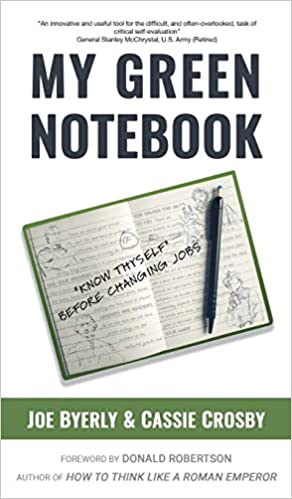
Self-development takes constant effort, and can often be a frustrating endeavor. Although there are many digital tools that aim to make this more efficient and productive, there is also considerable allure for writing things down. We’ve seen this with the increased popularity of journaling and list-making, and also in books/tools such as Ryder Carroll’s The Bullet Journal Method, and Rachel Wilkerson Miller’s Dot Journaling—A Practical Guide.
Now there is a new book by Joe Byerly and Cassie Crosby, My Green Notebook: “Know Thyself” Before Changing Jobs, which has its roots in the military. Joe is an active duty Army officer and Non-Resident Fellow at the Modern War Institute, and the founder of From the Green Notebook. Cassie is a retired Army officer and leadership coach with extensive experience leading high-performing, multifunctional teams in dynamic and complex environments; and is the founder of the leadership coaching and consulting company Iterata Solutions.
The website for Joe’s organization describes the origin of the name: “Walk into any organization in our military and there is one thing I guarantee you will find on a desk or in a cargo pocket: a small, green, government-issued notebook. it doesn’t matter whether a Soldier is a sergeant or a general officer, odds are they will have one of these military mainstays in their possession.”
I recently asked Joe and Cassie to discuss their new book in more detail, as well as describing the importance of reading for time-challenged people; and how their co-authoring worked in practicality.
- My Green Notebook: Know Thyself Before Changing Jobs seems like an action-oriented book. Can you describe one or two of the main points you’d like readers to take away from reading it, with perhaps a tip on how to get the most out of it?
Cassie: We want readers to understand that leadership is a state of becoming, rather than a state of being. As such, we must continually develop ourselves and deepen our learning through reading, writing, and reflection. This book focuses on the reflection aspect of our development.
Most of us are so busy, we pass through our experiences without deliberately capturing the lessons those experiences taught us. This book is an opportunity for leaders to reflect on a different aspect of their leadership over just 30 days and then create a plan for where to take their development next.
In the book, we present a model that helps leaders make meaning by taking a look inward and drawing out their unique stories so they can observe them and better understand them. We hope this experience helps leaders gain greater self-awareness and continue to grow, regardless of where they are in their development.
2. In Joe’s writing/blogging in particular, there is a strong emphasis on reading books, and being serious and intentional about it. Particularly for people who feel time-challenged regarding their reading, can you discuss what the role is in your book of reading books/articles/blogs/newsletters and the like; and of being a reasonably serious reader?
Joe: Psychologists have found that the information we allow into our consciousness influences what we focus on. If I read a book about Tesla, I start to notice Teslas on the road when I drive to work. Similarly, when I read a book about empathy, decision-making, or ego, I start paying attention to those areas of my life. Reading expands the limits of our experiences. It enlarges and enriches our mental models, helping us navigate future experiences and unlock insights from the past.
Many people think that they need to set aside large chunks of their time to read. I typically dedicate 15-20 mins a day during the work week, but those small investments of time add up, and before I know it, I’ve read almost five books in a month.
3. Can you describe the decision to become co-authors, as well as some information about how the co-authoring process worked on a practical, day-to-day basis?
Joe: We met a few years ago when Cassie helped me in editing for a project I was working on. That began a partnership of creating content together that evolved over time into what it is today. The best way for me to describe how it works now is like two songwriters, working on music together. Our writing usually starts with one of us bringing some new breakthrough or idea to the other. We’ll bounce the idea back and forth and challenge each other’s thinking until it grows into a well-developed idea. Throughout the writing process, our goal is to remove the ego and the emotion and focus only on sharing our hard-earned lessons with others so they can avoid the same mistakes we’ve made.
Cassie: Joe and I are both highly creative and always talking and working through concepts we want to write about. The process is so captivating and energizing at times that our marital partners have to remind us that we have other priorities in our lives.
Our co-writing works well day-to-day because we both understand our strengths and weaknesses in the writing process and our individual roles in getting a concept ready for prime time. It probably sounds overly complicated to most people to merge two disparate minds into cohesive content, but tapping into our collective minds speeds our learning and keeps us both mentally sharp.
